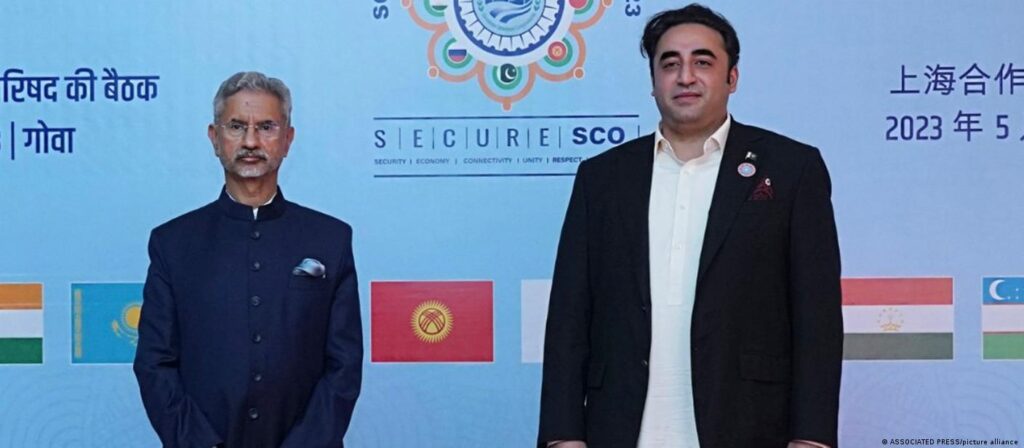
The Pakistan army’s new ISPRO, Maj. Gen. Ahmad Sharif came out – for the first time after the change of guard at the highest level – with an open warning to India. He says Pakistan can carry on fighting deep in the Indian territory. The warning came soon after the high-level talks between India and China had taken place. Along with that, Pakistan intensified its attacks on India for alleged violation of human rights in Kashmir at various platforms of the UN. All this was followed by a sham of “reconciliation” meeting between Imran Khan and the Shahbaz Sharif government in Islamabad. What the meeting was for is not the point. The point is the circumstances and the environment that led to the meeting.
All this was a big mask to cover the dubious game on Pakistan’s political chessboard. Something bizarre was unfolding in Pakistan’s political and military circles which we would like to unravel here.
As these developments were taking place, the news was leaked by a Pakistani news channel that the ex-COAS, Gen Qamar Javed Bajwa, had said in a closed-door meeting that Pakistan was not in a position to fight a war with India. He emphatically said that talks on resolving the Kashmir issue needed to be held with India.
At about the same time, it was leaked that Indian Prime Minister Modi would be visiting Pakistan next month. Mahmud Qureshi (the foreign minister in Imran’s Cabinet) rushed to Imran and asked him whether the rumour had substance. Imran ironically said that he was told India’s National Security Advisor Ajit Doval had been talking to some people in Pakistan but denied having been told formally anything about Modi’s visit. A Pakistani television channel hyped Hamid Mir’s disclosure of Gen Bajwa’s observations.
What General Bajwa had said carried grains of truth. Bajwa is an Ahmadi, and hence, has a different mindset. Before his retirement, he visited the US and met with his old friends at the Pentagon. US influential circles were willing to support the extension of his term in office and also consider him for the Nobel Prize provided he somehow managed a settlement of the Kashmir issue. Defence Minister Rajnath Singh’s warning that India would take back all areas illegally occupied by Pakistan had been resounding loud in Pakistan’s military circles and it became a focal point in talks that Bajwa had with his friends in Pentagon.
The crucial issue in this debate is the fast-growing and already massive anti-Pakistan mass movement in “Azad Kashmir” and Gilgit-Baltistan.
Two things are significant in this case. One is that the movement is non-violent in comparison to a similar movement sponsored by the ISI in the Kashmir Valley way back in 1990, which was fully armed and violent. Its second feature is that the leaders of the anti-Pakistan movement in both regions of POK (“Azad Kashmir” and Gilgit-Bltistan) declared to establish a secular and non-Islamic united State of Jammu and Kashmir. This had a very healthy impact everywhere in the world, and it was recognized by the mainstream Western and Arab press that in PoK it is an indigenous movement, not sponsored by India, contrary to what Pakistani sources claim.
As this political scenario progressed in the occupied part of Kashmir, another matter highlighted by Pakistani media was the visit of Pak foreign minister Bilawal Bhutto to India on the occasion of the SCO foreign minister’s meeting.
To the contrary, the radicals and Imran Khan & Co had been plotting to scuttle the visit. The Pak army is ideologically divided. There is a radical group covertly patronized by the present army chief. This radical group is in cahoots with Imran Khan and the people on his bandwagon like Mahmud Qureshi et al.
ISI is the diehard group which has always played an effective role in scuttling any chance of the two countries coming close to resolving the Kashmir issue. So the ISI, in line with its history, undertook the terrorist attack on an Indian vehicle in Bhimber Gali – Poonch sector in which five Indian soldiers were martyred. ISI expected that India would forthwith announce the cancellation of Bilawal’s visit on 4-5 May to New Delhi. It should be noted that sections of the “pro-liberal” press in India underplayed the terrorist attack and the loss of precious lives but paid great attention to Bilawal Bhutto’s visit and forcefully called for the cancellation of his visit for the reason of the terrorist attack. They were silenced by the Indian minister of external affairs, Dr Jaishankar who, while answering a question in a press conference, politely said that the invitation for participation in the SCO foreign ministers’ meeting was in accordance with the Charter of the SCO and that India would not like the Charter to be abused.
The issue is not whether the Track II negotiations will succeed or fail. The point is that some reasonable as well as influential circles in Pakistan’s power structure have come to realize that nursing unending enmity with an economically and militarily powerful neighbour with growing global clout has boomeranged on Pakistan. They realise that time has come for Pakistan to make an about-turn. India does not seek the disintegration and collapse of Pakistan because that would impact India’s security. India certainly wants Pakistan bereft of its long-standing terrorist ideology.






Add comment